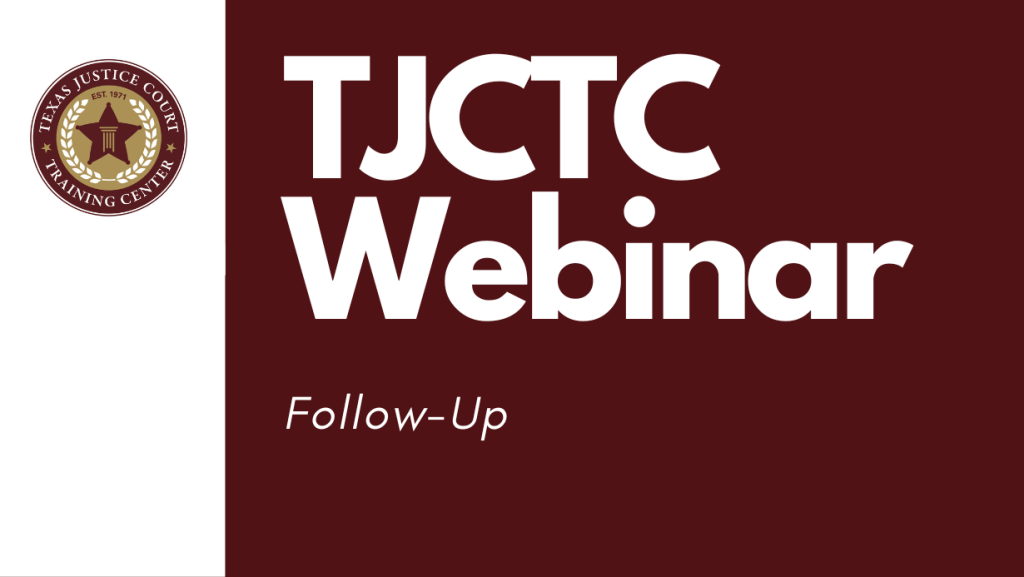
Mid-Month Updates
Please read this email fully for an important legislative update as well as some great training opportunities (some of them are FREE)!
Important note, if you downloaded Legislative Update Materials prior to 8/21/2025, please re-download the updated version, available today. We apologize, but some new information was provided this week that lead us to change a few slides.
For judges/clerks, changes were made specifically to sections regarding SB 1667, HB 654, and HB 2282. There were no changes made to the 2025 New Fine-Only Offense Chart. For constables/deputies, there were several minor changes made. There were no changes made to the Caselaw Update.

SB 1667 Expunctions
Note: If you attended the 8/19/25 Legislative Update in Corpus Christi, this update includes updated information from our presentation.
This bill applies to expunction petitions filed after 9/1/2025, and made changes to Code of Criminal Procedure Chapter 55A. (Note, this won’t apply to expunctions made other under code provisions, like alcohol offense expunctions.)
It requires district clerks to compile and maintain on their website a list of agencies/entities and their applicable email addresses, so that expunction petitions and orders can be delivered to the appropriate entities electronically.
New Fee: If an agency/entity cannot receive the order electronically, then the court shall charge a $25 fee effective 1/1/2026.
Old Fee: This bill repealed the “Fees in Expunction Proceedings” section. This means that starting 9/1/2025, the $100 fee for CCP Ch. 55A expunctions can no longer be charged. This also means only the new $25 fee discussed above will be charged (after 1/1/2026). Note, this repeal was an error that the legislature is seeking to reverse in the special session. If the new bill passes, the $100 fee will go back into effect 1/1/2026. TJCTC will keep you updated on this situation.
There are also new provisions regarding inspection and disposition of expunction records and retention of mental health records.
Want more info?
Review TJCTC’s legislative update slides on SB 1667
Read SB 1667

Legal Question of the Month
Release of Judgment in Error
A default judgment was granted against the defendant last year. A few months later, there was a Release of Judgment entered in the case. The plaintiff recently realized that the judgment was NOT supposed to be released, they have now submitted a “Motion to Vacate and set aside satisfaction of judgment”. Is this something that is possible, to set aside the release of judgment?
Answer: At this point, it may be best to have a hearing to ensure that there is nothing weird going on or no other mistakes are made, and give notice to both the judgment creditor and judgment debtor.
At the hearing, if the court finds that the release was entered in error, then the court can enter an order withdrawing or striking the release and noting what happened. This will also give the debtor an opportunity to be heard and know what is going on, as they might have no clue any of this happened.
Upcoming Training Opportunities

8th Annual Judicial Summit on Mental Health
Detailed Agenda Available
The 8th Annual Judicial Summit on Mental Health will be held October 7-8, 2025, at the Royal Sonesta Houston Galleria in Houston, Texas. Capacity for our in-person meeting is limited; we have fewer than 100 in-person spots left. Those who are not able to attend the meeting in person will have the opportunity to live-stream the event from their home or office.
Book your hotel room at the Royal Sonesta Houston Galleria by September 12 to get the Summit room block rate.
Don’t forget, registration is free! Register to attend in-person or online: https://web.cvent.com/event/e401bbc3-30ae-401f-be22-b1b385a958b7/regPage:3a358dcf-21b7-414c-ad7b-06220cc77043

TAC RMP Regional Pool Workshops
Various Dates from September 23, 2025 – October 02, 2025 (multi-day)
TAC Risk Management Pool Regional Workshops are scheduled around the state and are designed to be small, intense and topic-specific. These one-day sessions will cover the latest in risk control, human resources and law enforcement.
Who Should Attend?
Elected and appointed officials, decision-makers for the Pool, human resource directors and managers, workers’ compensation managers, and department managers or supervisors.
Registration Fees The workshops are provided at no cost to county officials and staff.
Learn More and Register: https://www.county.org/education-and-events/calendar-of-events/2025/tac-rmp-regional-pool-workshop/overview
Online Training

Human Trafficking Awareness Initiative from NCSC
NCSC has launched an initiative designed to help courts play an active role in raising awareness of human trafficking. CDL Drivers & Courts: On the Road to End Human Trafficking offers judges a tool to address this issue from the bench—a specialized e-learning course that can be assigned to CDL drivers who appear before the court.
The free, self-paced e-learning course educates commercial drivers on how to identify and report signs of human trafficking, understand reporting procedures, and comply with the No Human Trafficking on Our Roads Act, which imposes a lifetime CDL disqualification for drivers convicted of human trafficking in a commercial motor vehicle. Participants earn a certificate of completion that can be submitted to the court.
Resources for this initiative, including a judicial bench card, are available at https://www.ncsc.org/cdlhtainfo. Note, if you are a judge or clerk who completes this course and would like TJCTC Credit, please email your certificate to Jessica Foreman at jessforeman@txstate.edu.

Disaster Relief Help
Do members of your community still need disaster relief aid?
You can share the following link to resources from Texas Rio Grande Legal Aid with your community.https://www.trla.org/disaster












